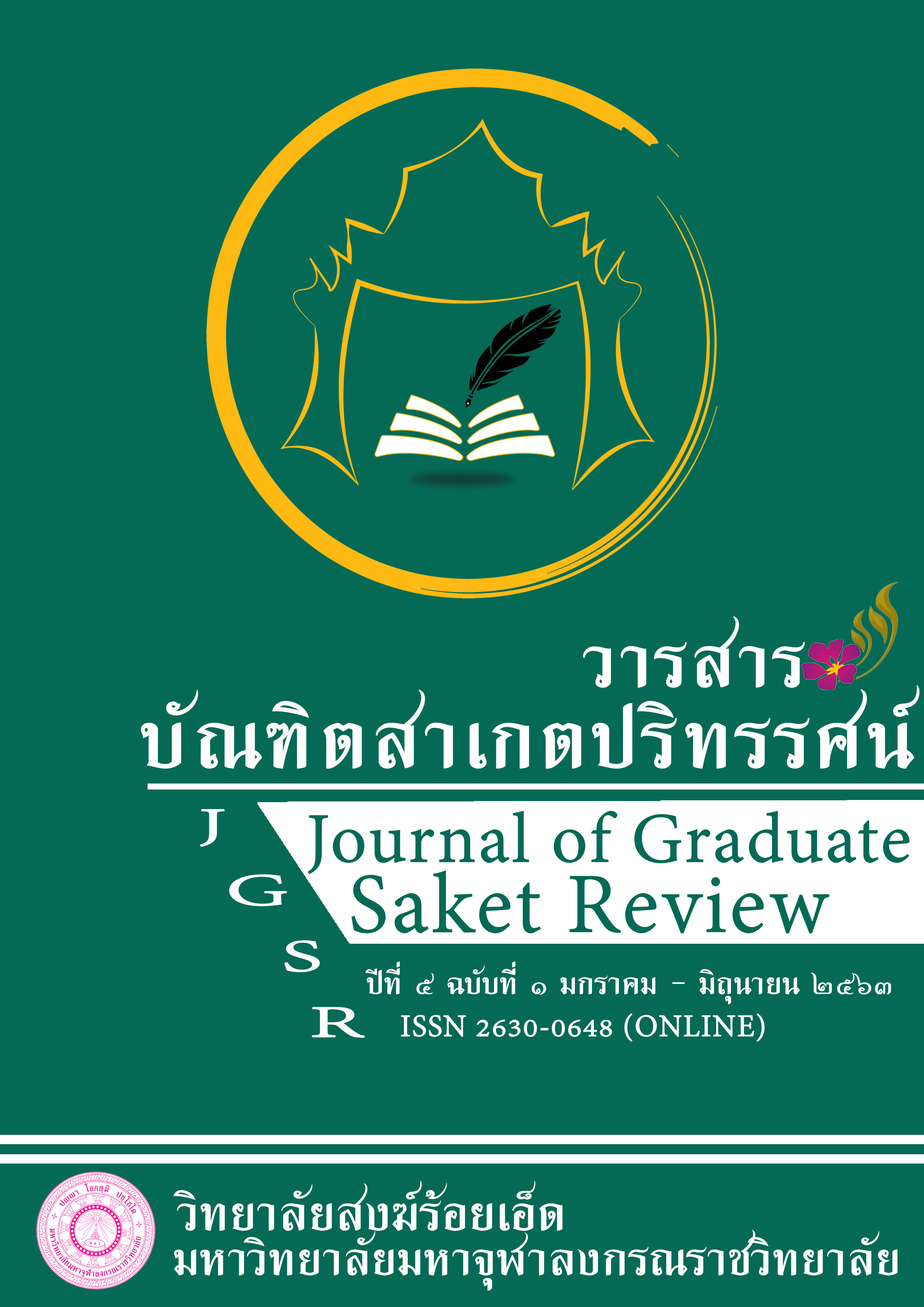Buddhist Psychology and Widowed women
Main Article Content
Abstract
Buddhist psychology is that the integration of western science, psychology and Buddhist principles, to clarify the mental phenomena and mental processes of human beings so that humans perceive the understanding of real life, understanding the nature of man that consists of the body and additionally the mind. Moreover, human will be able to develop the mind, to create wisdom and a better quality of life. The mandatory principles in Buddhism that describe the perceiving of the reality of life is Four Noble Truths that specify the way to understand the suffering, analyse issues that cause suffering, painless and to unravel the matter by itself. This is consistent with important theories of psychology and also accepted from contemporary psychologists that’s Acceptance and Commitment Therapy (ACT) that describes the happiness and significant life method whereas we have a tendency to additionally ready to deal with suffering that can’t be avoided. The suffering that ought to be treated psychologically is that the suffering caused by the widowhood of woman which can be caused by divorce or the spouse dies. Additionally, all the widowed women were affected each in their lives and psychological state. The widow's mental development method is also achieved by following the principles of Buddhism within the realm of the Four Noble Truths and Acceptance and Commitment Therapy (ACT) that each of them share a common achievement to live with happiness in those suffering.
Article Details
เนื้อหาและข้อมูลในบทความที่ลงตีพิมพ์ในวารสารบัณฑิตสาเกตปริทรรศน์ ถือเป็นข้อคิดเห็นและความรับผิดชอบของผู้เขียนบทความโดยตรงซึ่งกองบรรณาธิการวารสาร ไม่จำเป็นต้องเห็นด้วย หรือร่วมรับผิดชอบใด ๆบทความ ข้อมูล เนื้อหา รูปภาพ ฯลฯ ที่ได้รับการตีพิมพ์ในวารสารบัณฑิตสาเกตปริทรรศน์ ถือเป็นลิขสิทธิ์ของวารสารบัณฑิตสาเกตปริทรรศน์ หากบุคคลหรือหน่วยงานใดต้องการนำทั้งหมดหรือส่วนหนึ่งส่วนใดไปเผยแพร่ต่อหรือเพื่อกระทำการใด ๆ จะต้องได้รับอนุญาตเป็นลายลักอักษรจากวารสารบัณฑิตสาเกตปริทรรศน์ ก่อนเท่านั้น
References
ประสาน กำจรเมนุกูล. หญิงหม้าย : รูปแบบการปรับตัวที่เหมาะสมในสังคมอีสาน. วารสารความหลากหลาย ทางวัฒนธรรม คณะวัฒนธรรมศาสตร์ มหาวิทยาลัยมหาสารคาม. 12(27).
พระพรหมคุณาภรณ์ (ป.อ. ปยุตฺโต). (2558). พจนานุกรมพุทธศาสตร์ ฉบับประมวลธรรม. พิมพ์ครั้งที่ 30. กรุงเทพมหานคร: ผลิธัมม์ในเครือบริษัท สำนักพิมพ์เพ็ทแอนด์โฮม จำกัด.
ภานุวังโส และมิน ซอง ซิน. (2549). เกินกว่าฟรอยด์จะจินตนาการ. กรุงเทพมหานคร: เคล็ดไทย.
มหาจุฬาลงกรณราชวิทยาลัย. (2539). พระไตรปิฏกฉบับภาษาไทย ฉบับมหาจุฬาลงกรณราชวิทยาลัย.
กรุงเทพมหานคร: โรงพิมพ์มหาจุฬาลงกรณราชวิทยาลัย.
มหาวิทยาลัยมหาจุฬาลงกรณราชวิทยาลัย. หลักสูตรพุทธศาสตรบัณฑิต (พุทธจิตวิทยา). (2540). กรุงเทพมหานคร: มหาวิทยาลัยมหาจุฬาลงกรณราชวิทยาลัย.
ยงยุทธ วงศ์ภิรมย์ศานติ์. (2548). คู่มือการพัฒนาตนเองแนวพุทธสำหรับผู้ให้คำปรึกษา. ฉบับที่ 2. นนทบุรี: กรมสุขภาพจิต.
สำนักงานสถิติแห่งชาติ. กรมการปกครอง กระทรวงมหาดไทย. รายงานสถิติจดทะเบียนหย่า ประจำปี พ.ศ.2558. สืบค้นเมื่อ 16 พฤศจิกายน 2559. จาก https://www.msociety.go.th/article_attach/ 15969/19089.pdf.
Hayes, S.C., Strosahl, K.D., & Wilson, K.G. (1999). Acceptance and commitment therapy: An experiential Approach to behavior change. New York: Guilford Press.


